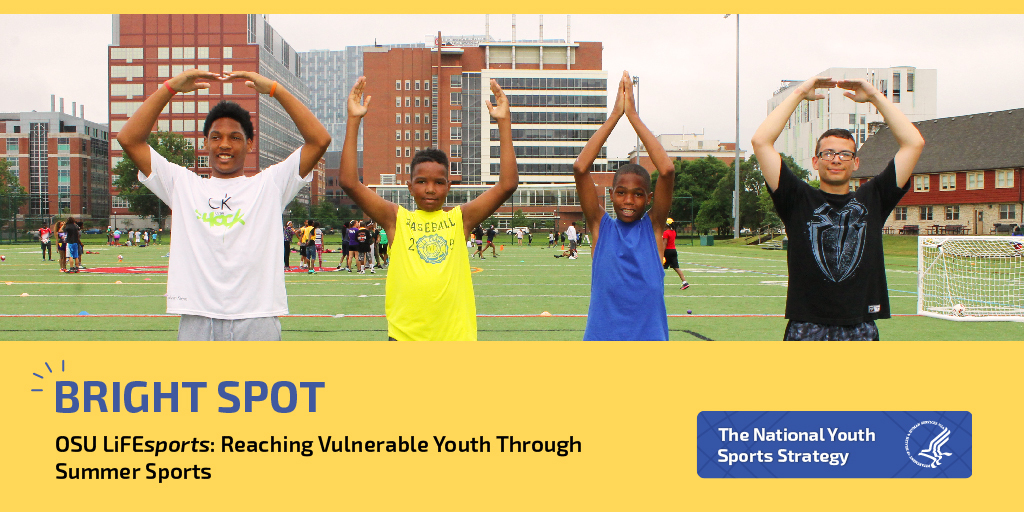From the National Youth Sports Strategy Bright Spots, a series that highlights how successful programs are boosting youth sports participation across the Nation.
At Ohio State University’s (OSU) LiFEsports, sports participation is about a lot more than scoring goals. This free summer program uses sports to improve youths’ social skills. Through intentional play-based curricula, youth focus on self-control, effort, teamwork, and social responsibility.
LiFEsports aims to reach youth in underserved communities: 80 percent of participants are living close to or below the poverty line, and many have significant behavioral and mental health challenges. On average, LiFEsports has about 600 participants every summer.
Strategies: Team Up for Success
LiFEsports has a winning combination of program staff from various departments and offices within OSU, including the Department of Athletics, the College of Social Work, the Department of Recreational Sports, the Office of Outreach and Engagement, and OSU Extension. Students, athletic leaders, and community counselors work together to help youth learn social skills through sports participation. Additionally, licensed social workers and behavioral specialists provide positive behavior support both on and off the field.
This year, the program launched LiFEsports+, a community-based camp that will serve 80 additional youth at a City of Columbus Recreation and Parks Department community center. The camp is for youth ages 9 to 15, but LiFEsports keeps older teens involved through participation in a leadership academy where they train to be camp counselors and work on college readiness throughout the year. LiFEsports hopes to continue expanding to give all youth in the Columbus area the opportunity to participate.
Impact: Youth Reaching Higher
Getting youth to return to the program and stay engaged over time is important, says Dr. Dawn Anderson-Butcher, Executive Director of Teaching and Research. And she’s happy to report that 55 percent of youth participants come back every summer. But she says LiFEsports is more interested in what youth take away from the program, like the desire to continue their education. The program has proven successful on that front, too: 83.6 percent of participants report that their involvement in the program makes them want to go to college.
In addition, LiFEsports data show that the program has the greatest impact on the youth who really need it. “Kids who come into LiFEsports with the poorest social and emotional skills benefit the most from our programming,” says Anderson-Butcher.
Lesson Learned: Leverage Existing Resources
At OSU, LiFEsports recruits students and student athletes from 14 different majors to serve as coaches, enabling many to fulfill internship requirements and gain valuable experience working with at-risk youth. LiFEsports is working to make its evidence-based model replicable for universities across the country; the idea is to encourage other schools to leverage existing infrastructure and create similar programs.
Every summer, Anderson-Butcher sees how the program makes a difference in the lives of vulnerable youth. “At LiFEsports, you’re not just coming to play. You’re here to develop into a stronger person—and to learn skills that you can use anywhere you go.”




